
It's taken nearly seven months, but Friday night I found myself reentering the welcoming embrace of a movie theater. Despite some initial anxiety, I felt relatively secure once I sat down. The theater was mostly empty, only sparse duos similarly occupying the theater, all appearing mask compliant. However, once the lights dimmed, I was filled with a feeling of warmth, as though I had fallen into the embrace of a long loved, long lost friend, in whose company I was elated to return. The fact that Armando Iannucci's The Personal History of David Copperfield revealed itself to be joyously life-affirming was the icing on an already well-prepared confectionary.
Hearing that Armando Iannucci was adapting Charles Dickens' beloved Bildungsroman causes a bit of a double take. After all, this is the man who gave us the scathing, nightmare comedy worlds of In the Loop, The Thick of It, Veep, and The Death of Stalin. He traffics in despicable characters doing and saying shockingly awful things, inspiring incredulous, horrified laughter. He's not the obvious choice for a film in which humor tickles the rib cage rather than sliding in a knife. Yet, he, along with his frequent collaborator Simon Blackwell, manages to create a Dickens adaptation with a vibrancy that leaps off the screen.
The narrative centers around Copperfield as he works to regain his social standing. As the narrative progresses, characters bestow a multitude of variations of his name upon himself, meaning as he works to establish his own identity, he is also working to regain the right to be called the name with which he was born.
The film opens with an upfront acknowledgement of its inherent theatricality, as the titular David Copperfield (a wonderful Dev Patel) begins the narration of his life on a stage, after which he breaks through his backdrop into a country home where he witnesses his own birth. From that point on, we understand he's reflecting on his past, while also giving it his own unique narrative flourish.
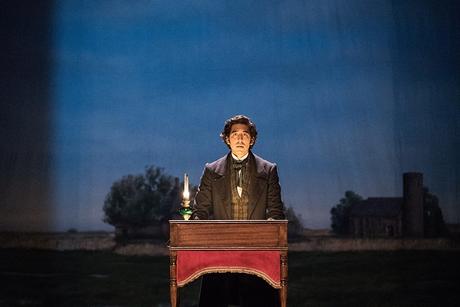
David Copperfield's life begins idyllically, complete with a mother that loves him and a visit to a boat fashioned into a home owned by the kindly Mr. and Mrs. Peggoty (a delightful Daisy May Cooper and Paul Whitehouse), where he is well-loved and encouraged to daydream and create.
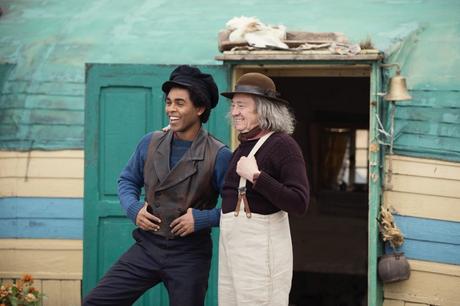
However, all of that changes once his mother remarries a man with the forbidding name of Murdstone (Darren Boyd), who enters the home dressed in black and demands that the brightly illuminated parlor be made darker. David finds himself shuffled into factory work and living with the perpetually in debt and eternally optimistic Mr. Micawber (a likably scoundrelish Peter Capaldi), who presents like a more upbeat, comedic Fagin.
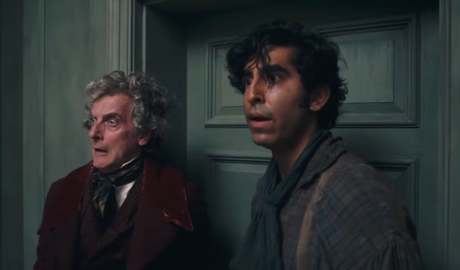
Eventually, Copperfield finds himself staying with his wealthy, donkey-hating Aunt (a delightful Tilda Swinton) and her cousin, Mr. Dick (a fabulous Hugh Laurie), who send him to a charmingly dilapidated boarding school run by the happily, persistently inebriated Mr. Wickfeld (Benedict Wong) and his witty, charming, unflappable daughter, Agnes (an incandescent Rosalind Eleazar). While at school, he runs afoul of Ben Whishaw's sniveling, personal space-invading Uriah Heep, who will play a major role in much of the film's later narrative.
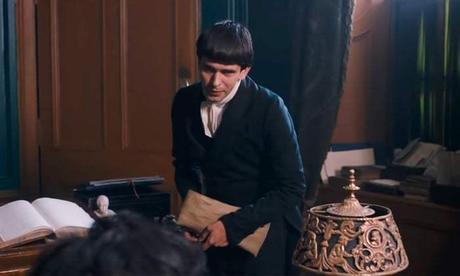
That description sounds rather heavy for a film as light on its feet as The Personal History of David Copperfield, but Iannucci balances this exposition-heavy plot description with a gentle, playful humor that carries all the way through the end of the story. Beyond that, Iannucci, along with cinematographer Zac Nicholson, bathes the film in surprisingly lovely visuals. Gone are the somber grays and blacks that tend to populate Dickens adaptations. In their place, we are instead treated to bright, lovely pastels that wouldn't feel out of place in a Terry Gilliam film. As a result, we have a film that looks like a mixture of fantasy and realism, emphasizing the way happy memories manage to shine just a bit brighter in recollection.
This marks a surprising evolution for Iannucci. Unlike the steady parade of tight close-ups and faux-documentary stagings that characterize In the Loop and Death of Stalin, Iannucci's camera in Copperfield feels delightfully unleashed. He clearly relishes playing with visual flourishes to convey the ways reality intertwines itself with memory and flights of fancy.
Yet, this is still a Dickens story. As such, for all the lightness and color on display on screen, lurking beneath Copperfield 's confectionary surface is the very real idea that those who cannot ascend through society are left behind and forced to scramble and scheme to get whatever they need to survive. For a film about someone wanting the ability to create his own destiny, we see a plethora of characters who remind the audience that such a luxury can often only come for those with means.
Charles Dickens' novels are famous for the colorful characters that drift in and out of his narratives, and Copperfield is no exception. The film could become bogged down under the weight of its narrative complications and characters defined solely by eccentricities were it not for the playful way the cast approaches the material.
In fact, the film is so overstuffed with gifted performers performing scene-stealing turns that it would be easy to miss some of the less colorful brilliance on screen. It's easy to take note of Tilda Swinton's oscillations between calm frustration and near hysteria or Peter Capaldi's crimes against a squeezebox, but easier to overlook Hugh Laurie's brilliant turn as a man who believes the thoughts of beheaded King Charles I have invaded his own brain, his only respite writing them all down on scraps of paper. Laurie ensures we find humor in the absurd plight, while never letting the audience forget that there is something slightly damaged and mentally broken about this man tormented by the need to write nonstop (a character perhaps inspired by Dickens himself). It's a lovely performance, and his involvement in a kite-flying quest is one of the film's visual highlights.
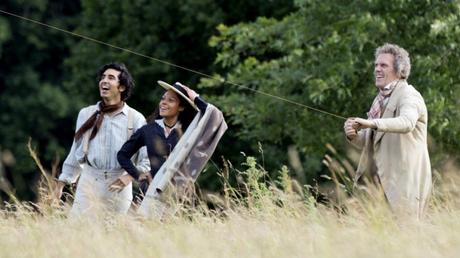
However, despite the witty script and brilliant supporting cast, nothing would work without the right actor in the titular role, and Dev Patel is absolutely wonderful.
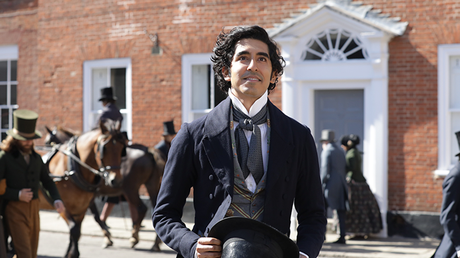
He manages to ground the eccentricity that perpetually surrounds him by slightly underreacting to it, instead allowing his wide eyes and physicality to convey Copperfield's elation, heartache, and occasional bafflement. His more grounded central work ensures the larger-than-life performances around him don't feel like too big or alienating.
Much like Iannucci's previous film, The Death of Stalin, was a cacophony of accents, The Personal History of David Copperfield is a world of multiple ethnicities interacting with each other without their backgrounds being referenced. There's no commentary to it, no subtext. Instead, it appears as though the best actors for the roles have been cast, with no thought to their ethnicities whatsoever. It serves as a nice retort to the previously 19 th century novel adaptations who traffic in exclusively lily-white casts while hiding under the umbrella of "historical accuracy" by showing that there is another way to present such projects. That approach alone is worthy of championing, and the fact that the performances feel so, so right is all the more satisfactory.
Really though, what gives the film its heart is its examination of memory, and narrative and identity. Iannucci has taken a well-worn narrative and used it to emphasize the way in which memories make us who we are. David Copperfield's quest to be worthy of the name given to him that is frequently stripped by others' disregard for his identity ultimately represents a desire to return to the person he was when he felt most at home with himself. By allowing the character to scribble down his own story, he's regranted power over his own life.
Perhaps it was just the joy of being back in front of a movie screen, but I wanted to hug this movie. The situation behind the screening could be coloring my rosy view of the film, but I don't think that's the case. This may have been the film I needed at the right time, but I would have loved it at any point. I found myself enraptured by its lush visual style, frequently laughing out loud at its witty script, and completely engaged with David Copperfield's (and David Copperfield's) narrative journey. It was wonderful to be back in a movie theater, but this film, with its vibrancy and good humor was the ideal maiden voyage.

